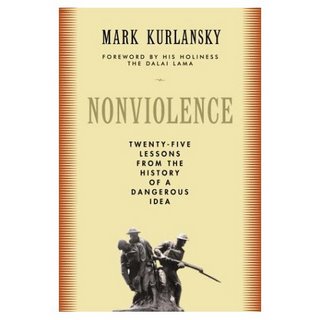
Listening to NPR this morning, I heard an interview on the Diane Rehm show that I have to share with everyone. It was with author Mark Kurlansky on his new book, entitled Nonviolence: 25 Lessons From the History of a Dangerous Idea.
He began the interview by explaining the title of the book, and the fact that while he himself does not think of nonviolence as a dangerous idea, throughout history, advocates of nonviolence have been met with ridicule or great fury. Interestingly enough, he mentioned, when one thinks of the word nonviolence, it becomes clear where our cultural values are. He claims that no language in the world has a proactive word for nonviolence, rather what we have is a negation of the idea of violence. In other words, linguistically and culturally, violence is the norm and nonviolence is an aberration. Kurlansky distinguishes between nonviolence and pacificsm. (This was interesting to me, as I had always thought of the two terms as interchangeable). But according to him, nonviolence is active resistance, just through means that do not bring bodily harm to your opponent. Part of nonviolent ideology is that violence begets violence and there is no way out of that path. He talked about how nonviolence has repeatedly scored victories (Gandhi and Indian liberation, the overthrow of the Pinochet dictatorship in Chile) while wars and violence constantly fail (cf. Palestine vs. Israel, the U.S. presence in Iraq and Afghanistan) but that it is normal to think of wars as what "gets things done" and nonviolence as cowardly and ineffective.
His insights on supposedly "just" wars such as the American Revolution and Civil War are truly enlightening. I think this idea of nonviolence-using strategies such as resistance, demonstrations, non-cooperation, legal proceedings, street theater, information dissemination- are very close to what veganism is all about. Every time we refuse to eat an animal product or purchase from companies that test on animals or participate in circuses or zoos, we are actively resisting a cultural wrong. However, as someone whose political views are often in the minority (veganism, Green party, radical feminism, etc.) I also know the frustration that leads us to sympathize with more violent forms of protest and resistance. I am sympathetic to the Animal Liberation Front, the Earth Liberation Front, the Black Panthers, the Weather Underground, and other groups such as these.
What the interview this morning inspired me to think about, though, was what tactics have the most chance of having real material results in the long run. Either way, standing up for what you believe is difficult. The question is, what is the best way?























4 comments:
What a poignant post. That book sounds very interesting. Thanks for the "food" for thought today :)
Thanks for such a succint summary Bazu!
Today while waiting for the subway I watched a trendy girl walk past me. She looked hip and comfy in her clothes, but her camoflouge purse upset me. It reminded me of all the hundreds of people I see who wear militia style clothing and accessories. Some of them are my friends (who I know are against war), some of them are their toddlers (who look like little army brats). I am always very puzzled by the fact that people don't make a connection to what they are wearing and the current war raging climate...
ps I got the Greenpeace tee for my son in a size 6 but it's tiny. He's only 2 years old, and it probably won't fit him beyond the next 6 months!
Thank you all for your comments. This book really was "food" for thought for me all day... I'm one of those vegans that gets frustrated very easily. 10 billion farm animals killed every year?! {Growl} So this interview gave me hope that quiet acts of resistance can and will eventually win out.
P.S. Village Mama, that is amazing about the shirt- they run small, don't they? Thanks for the tip!
Post a Comment